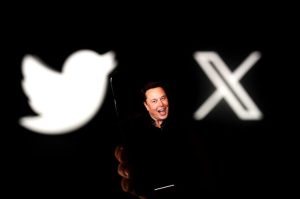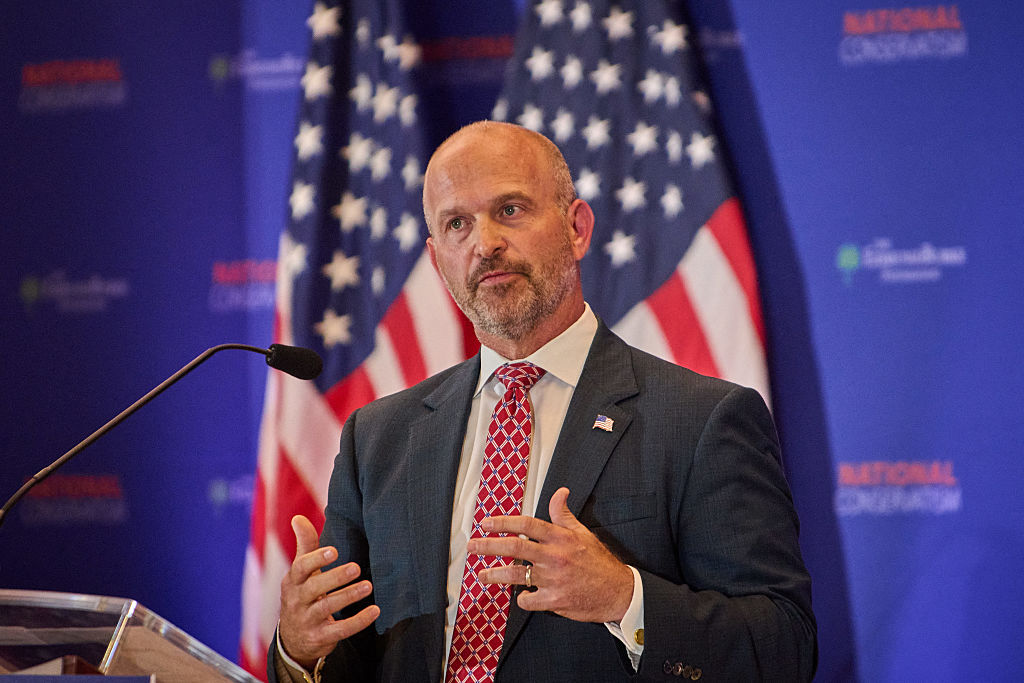Scene: the beach at Tel Aviv. Jews disport themselves in the waves, soundtracked by a Yiddish-absurdist tinkling reminiscent of Curb Your Enthusiasm.
‘Attention all swimmers! Attention all swimmers!’ the lifeguard shouts into the megaphone. ‘Stay to the right — it’s much safer!’
‘Bibi?’ Two young men interrupts their game of beach tennis. ‘Mr Prime Minister, what are you doing here?’
‘Doing what I always do, keeping you safe,’ Netanyahu says. The nation’s lifeguard explains that he’s ‘supposed to start another shift’ on September 17, but it’s up to the two young men. They’re secular, Ashkenazis from Tel Aviv, the kind who despise Netanyahu and Likud’s chauvinism. They ask about the alternatives.
‘Lightning doesn’t strike twice,’ Bibi says, jabbing at Ehud Barak, the failed peace-processor whose surname means ‘lightning’ in Hebrew.
‘The group with the boogie, you are no longer on the right,’ he shouts, dunking Moshe ‘Boogie’ Yaalon, who left Likud and is now with the Blue and White centrists. ‘You are entrenched deep in the left.’
‘It’s always the drifters,’ he confides to two young men. ‘Alright, guys, head into the water, have some fun.’
‘Citizens of Israel,’ Bibi turns to the camera, smiling so we know he knows that we know he knows it’s time to ask for votes, ‘in the stormy sea of the Middle East, we’ve proved that we’re maintaining Israel as an island of stability and security.’
End card: ‘Netanyahu: Proven Leadership.’
מי בא לים? pic.twitter.com/IU4AMsUwb6
— Benjamin Netanyahu – בנימין נתניהו (@netanyahu) August 13, 2019
Netanyahu’s campaign advert, ‘Who’s come to the sea?’, is a masterpiece of irony — which is to say, it says one thing but means another. The soundtrack evokes the absurd diaspora comedy of Larry David, where good intentions, and genuine attempts to settle differences with the neighbors, ends in humiliation. But the setting is the absurd national tragedy, where everyone eats Palestinian chicken, but every good intention and attempt to settle differences with the neighbors leads to bloodshed — and where the Jews always have their backs to the sea, literally in the case of the two young men of military age.
It’s a clear but complex pitch. It’s serious about the political realities, but it’s also self-knowing about its bias. Netanyahu has proved he’s Mr Security, Barak has had his moment, and Ya’alon is a splitter. But Netanyahu is a merciless operator tainted by corruption charges, and he’s asking for votes in an election that didn’t need to happen. In April’s elections, Likud won the most seats, but the ‘drifters’, in this case those who had drifted further right after falling out with Netanyahu, refused to form a coalition. Netanyahu now has to refight April’s campaign in September.
In April, the vote looked so tight that Netanyahu went to the beach on polling day, to drive potential Likud voters into the booths. Now, he’s back on the beach, and in charge. The argument, and the political realities, suggest that lightning, which has already struck more times for Netanyahu than for any other Israeli prime minister, will strike again in September. If it does, his victory will derive not just from his mastery of the traditional and opaque arts of politics, but also his facility with the new and deceptively transparent arts of digital communication.
As media and politics merge, who comes out on top? The most successful politicians are the ones who can ironize their personae without losing their message. Those personae become single-name brands: Trump and Boris and Bibi, like Elvis before them, or John and Paul and the other two. The earnest look old and foolish, even in the United States, where earnestness used to sell.
In ‘Who’s come to the sea?’ politics plays through media: the irony and the comedy serve the message. For an ad that fails because the media drowns out the politics, see ‘Elizabeth Warren’s family story’. This also has an ironizing soundtrack — Donald Trump, calling Warren ‘Pocahontas’ — but it feels like a broadcast from the Nineties, when Al Gore was still perfecting his internet invention.
https://www.youtube.com/watch?v=RHzbdZuVyAM
Or, if you can tolerate an even higher degree of earnestness without vomiting, try Beto O’Rourke’s campaign announcement, in which O’Rourke, accompanied by his loyally silent and frenziedly smiling wife Amy, spoke to the camera like he was announcing a run against Eisenhower.
The importance of being earnest is now minimal in politics. It’s important now to be honest — about real dangers, about the mediated game of politics, about the fatuity of earnestness as a substitute for realism. The union of media and politics wasn’t invented in the United States. Leni Riefenstahl had shot ads for Hitler and Mussolini had put a radio in every Italian home before FDR delivered his ‘fireside chats’ and dodged the cameras when he was in his wheelchair. But it was in America, in the Fifties and Sixties, that Madison Avenue and Pennsylvania Avenue merged in liberal democratic form. The stagnation of American campaign ads — their replacement, even, by Trump’s spontaneous cable news show — is a another suggestion that the United States, once the global arbiter of popular culture and media savvy, is falling behind.
Dominic Green is Life & Arts Editor of Spectator USA.

























